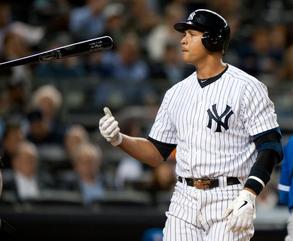 The season wasn't supposed to end this way. The Yankees finished the season with the best record in the American League, most home runs hit, second most runs scored, and had 53 years of postseason experience in their starting lineup alone. Anything short of their 28th World Series Championship would be considered a failure, and regarded by many as the favorite to win the fall classic. They had All-Stars Derek Jeter , Robinson Cano, Curtis Granderson, and CC Sabathia. Hiroki Kuroda won 16 games and had a solid 126 ERA+, while the bullpen included Rafael Soriano (42 SV, 2.26 ERA) and David Robertson (12 K/9, 157 ERA+) After all, they were the New York freaking Yankees, the most storied franchise in all of sports. They had momentum (finished season on 13-4 run) Yet, a season that began with lofty expectations and in complete disaster, following an embarrassing sweep at the hands of the Detroit Tigers. The Yankees cruised into the playoffs finishing the final month 19-9 with contributers such as Robinson Cano (.593/.600/1.074) and Curtis Granderson (.333/.393/750) red-hot over the final week. Since they had the best record in the league and won the division, the Bombers would also be exempt from the sudden-death Wild Card Game and have "home-field advantage" throughout the playoffs. After a Orioles victory in the Wild Card game, the Yankees would be playing the intra-divisional rival whom they were an even 9-9 during the regular season. An exciting number of close games, peppered with heroic performances ( Raaaauuuul!), took the Yankees to a deciding game 5 which saw a dominant C.C. Sabathia take the Yankees to the ALCS. A series in which the Yankees as a team only batted .211/.278/.333 could have provided some apprehension towards future success but could the Yankees talented offense remain ice-cold. After all, they had the most runs scored, home runs, on base percentage, slugging percentage in the league. No way the mighty Yankees would futile in the batter's box for another series… Well, not only did they stay frigid with the bat, but the Yankees took a bad offensive performance and made it historic. The Yankees had the worst batting average (.188) in a single postseason, Robinson Cano's 0-29 stretch was the longest in postseason history, and only scored one of their six runs prior to the ninth inning. Furthermore, Quentin Berry (yes, Quentin Berry) had a higher OPS (.625) than all but four Yankees. Additionally, the staff was not that great as New York pitchers combined for a 4.14 ERA. Clearly, the Yankees just fell apart this series and were overmatched especially at the plate. Big names such as Robinson Cano , Nick Swisher , Alex Rodriguez , Mark Teixeira , and even Raul Ibanez all batted below .250. Also, it's not just that they slumped but the fact that they were the best offense in the American League and frankly because they have the highest payroll in the league. Teams with $209 million payrolls and that kind of talent are not supposed to flounder in October, no matter how good the opponent is. No doubt, credit should go to Detroit, as their pitchers (minus Jose Valverde ) only allowed 2 runs in the entire series and hitters combined for an .802 OPS. They were another talented team that vastly underperformed (rather, in the regular season) and had a mountain of payroll and expectations coming into the season. Nevertheless, the pathetic showing by the Yankees cannot be explained by much other than the fact that their offense did not show up, clear and simple. After an embarrassing postseason, the Yankees will face a series of decisions this offseason. Nick Swisher, Russell Martin, Hiroki Kuroda, Andy Pettitte, Mariano Rivera, Ichiro Suzuki and Raul Ibanez are all free agents. Most likely is that Swisher will leave for a long-term commitment, depriving the team of a good OBP source and their starting RF. Theoretically, if Ichiro is resigned, the Yankees can go Brett Gardner in LF, Granderson in CF, and Ichiro in RF. I could definitely see the Yankees going this path considering Ichiro's success in pinstripes without having to pay the big bucks for Swisher's services. Also, Rafael Soriano possesses an opt-out clause to become a free agent. Presumably, Soriano will take this in order to obtain more years at a premium price. Additionally, it seems fairly reasonable that Pettitte, Rivera, and Kuroda will be back due to their desire to stay in the Bronx. Other than some minor moves for bench and bullpen players, the Yankees do not have any glaring holes to be filled. However, one major concern is the aging of the team. The Yankees will have 0! position players under 30, barring a offseason move. This aging, although it may not have been clearly visible yet, should result in a gradual attrition of their ability to hit and play the field on an everyday basis. Alex Rodriguez has already showed signs of slowing down in his own miserable postseason (have fun with another 5 years $114 million Yankees fans) as well as Mark Teixeira. Robinson Cano will play next season at age 30 and will command a long-term commitment upwards of 6-7 years. And despite his defensive shortcomings, Derek Jeter cannot keep producing offensively, right? Brain Cashman and the front office must add youth to this team sooner rather than later. Even the Yankees have to restock on talent at some point. Personally, this is how I would fix the Yankees and their age issue. First, I would trade Alex Rodriguez to anyone who wants him and absorb the majority of his contract so that the team could obtain better prospects. Second, I would not extend Robinson Cano to a long term contract. He will be entering his post-prime and although he has had no injury history to this point, second basemen have a tendency to break down rapidly following their age 30-32 seasons (see Utley, Chase). Lastly I would trade Mark Teixeira and eat most of his contract so once again, better prospects could be sent back to New York. Although, the Yankees still have a ton of talent, their offensive struggles highlighted a growing concern about the team's age and its ability to hold up over a full season. This is something needed to be addressed over the next season, or else the Yankees, although equipped with the most financial freedom in the game, will have a rude awakening
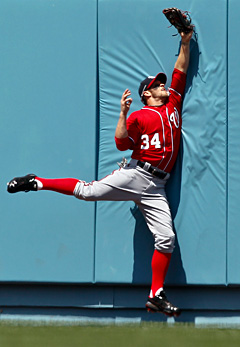 Some say he’s going to be the best player the game has ever seen and a lock for 500 home runs, if not many more. This high praise started in high school for Bryce Harper at age 16, when he appeared on the cover of Sports Illustrated, and was dubbed as baseball’s “chosen one.” As a freshman in high school Harper hit a moonshot that traveled 570 feet. That’s the type of strength this young phenom was blessed with. Bryce was so advanced for his age that he dropped out of high school after his sophomore year, got his GED, and went to College of Southern Nevada. Scouts would have been happy with just surviving against much older competition. Instead, he dominated and won the Golden Spikes Award, in honor of the best player in amateur baseball. After just one year at Southern Nevada, he declared for the MLB draft and was selected with the number one overall pick in 2010 by the Washington Nationals. Harper, just turning 20, has jumped through the minor league system and has started in both center-field and right-field for 2012's best regular season team, the Washington Nationals. In addition to his outfield versatility, Harper possesses power and bat-speed that is far and away already better than most major league hitters. He lived up to all the hype and expectations hitting at a .270/.340/.477/.817 clip with 22 home runs in 2012. His 22 home runs are the second most by a teenager in Major League history (Tony Conigliaro with 24). There’s no question the power is there for Bryce, but he has excelled in other facets of the game as well. He has shown great patience at the plate, a trait most young hitters lack, with a walk rate of 9.4%, which is higher than the league average of 8%. He is also above average in categories such as WAR (5.0) and OPS+ (119). He’s no Mike Trout in terms of speed (but then again, who is?), however he does have above average wheels and has the ability to steal bases, as he was 18 out of 24 (75%) in 2012. With impressive tools like hitting for average, hitting for power and speed on the base paths, Harper fills out the remaining tools just as well. Bryce, a converted outfielder after being a catcher much of his amateur career, was clocked throwing 96 MPH in high school. Today, he utilizes his rifle in the Washington outfield. Harper had a very impressive 8 outfield assists in his rookie campaign. Even though Harper made 7 errors, he is still young and had a well above league average 14 defensive runs saved. Remember, he should have just finished up his freshman year in college. Instead, he's posted some of the greatest teenage numbers in baseball history. These types of numbers at such a young age make people wonder what this kid can do in the future, which may be scary. Additionally, Harper is praised for the things that do not show up on the stat sheets. His intense fire and passion for playing the game of baseball is what makes him so successful early on in his career. To some, he may come off as being arrogant and cocky. However, I look at him as being confident and a guy who simply plays the game how everyone should play it by running every ball out as hard as he can. Just consider yourself a clown if you want to question Harper’s ability to play baseball at its highest level, bro.
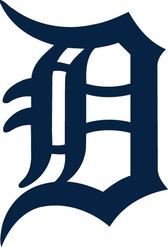 Nick Rabasco:
Game 1: Tigers 4 - Giants 2
Game 2: Tigers 3 - Giants 6
Game 3: Giants 4 - Tigers 5
Game 4: Giants 2- Tigers 1
Game 5: Giants 0 - Tigers 3
Game 6: Giants 3 - Tigers 4
2012 World Series Champion: Detroit Tigers
WS MVP: Justin Verlander
Notes: I predict a fairly low scoring series due to the strength of both pitching staffs. Also, the Tigers pitching staff was lights-out in the ALCS and I have Justin Verlander turning in two more masterpieces in games 1 and 5 on his way to MVP. Although the trio of Matt Cain, Barry Zito and Ryan Vogelsong had great outings in NLCS elimination games, I believe the tigers offense led by Austin Jackson, Miguel Cabrera and Prince Fielder is enough to get by.
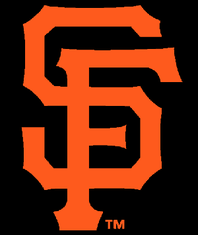 Aidan Flynn:
Game 1: Tigers 7 - Giants 0
Game 2: Tigers 2 - Giants 5
Game 3: Giants 1 - Tigers 3
Game 4: Giants 2 - Tigers 1
Game 5: Giants 0 - Tigers 6
Game 6: Tigers 2 - Giants 6
Game 7: Tigers 3 - Giants 5
2012 World Series Champion: San Francisco Giants
WS MVP: Angel Pagan
Notes: As shown above, I fully expect the Giants to win their 7th World Series championship and bring the title back to the city of San Francisco. I believe that the Giants offense is quite underrated (highest OPS+ in NL) due to the offensive suppression caused by AT&T Park. In my opinion, the Giants' lineup presents a more balanced attack compared to the top-heavy lineup of the Tigers. Additionally, I have more faith in the Giants pitching than that of the Tigers (except when countering Tigers' ace Justin Verlander, of course) due to their consistency of their bullpen. This will help they conserve victories in the close games where the Tigers' bullpen cannot. Either way, baseball is a sport where anything can happen, with this postseason being no exception. Boy, do I love baseball!
As the 108th World Series is about to kick off, we here at BTP wish to unveil our first annual Behind the Plate Award Winners, in honor of each player's tremendous season. We carefully selected each player after much conversation and debate, trying to ensure we selected the most deserving candidates. Many of our awards derive their names from the players that best exhibited what each award represents. A short description for each award is as follows:
Best Player Award: Pretty self-explanatory, we wanted to remove the term "valuable," as it can be interpreted several different ways.
Walter Johnson Award: Named after arguably the greatest pitcher of all-time, this award is presented to the pitcher who had the best season in his respective league.
Babe Ruth Award: Named after arguably the greatest hitter of all-time, this award is presented to the hitter who had the best season in his respective league.
Mariano Rivera Award: Named after arguably the greatest relief pitcher of all time, this award is presented to the reliever who had the best season in his respective league.
Mike Trout Award: Named after the player who arguably completed the greatest rookie season of all time, this award is presented to the rookie who had the best season in his respective leagve.
Connie Mack Award: Named after the winning-est manager in Major League history, this is presented to the best manager in his respected league.
Branch Rickey Award: Named after one of the most innovative and influential executives in Major League history, this is presented to the executive that made the best transactions toward improving his club for the 2012 season.
And without further adieu...
Best Player Award:
American League: Mike Trout, OF, Los Angeles Angels of Anaheim
National League: Buster Posey, C, San Francisco Giants
Walter Johnson Award:
American League: Justin Verlander, Detroit Tigers
National League: R.A. Dickey, New York Mets
Babe Ruth Award:
American League: Miguel Cabrera, 3B, Detroit Tigers
National League: Buster Posey, C, San Francisco Giants
Mariano Rivera Award:
American League: Fernando Rodney, Tampa Bay Rays
National League: Craig Kimbrel, Atlanta Braves
Mike Trout Award
American League: (Surprise!) Mike Trout, OF, Los Angeles Angels of Anaheim
National League: Bryce Harper, OF, Washington Nationals
Connie Mack Award:
American League: Buck Showalter, Baltimore Orioles
National League: Davey Johnson, Washington Nationals
Branch Rickey Award:
American League: Billy Beane, Oakland Athletics
National League: Mike Rizzo, Washington Nationals
All BTP 1st Team:
C: Buster Posey, San Francisco Giants
1B: Prince Fielder, Detroit Tigers
2B: Robinson Cano, New York Yankees
3B: Miguel Cabrera, Detroit Tigers
SS: Ian Desmond, Washington Nationals
OF: Mike Trout, Los Angeles Angels of Anaheim
OF: Ryan Braun, Milwaukee Brewers
OF: Andrew McCutchen, Pittsburgh Pirates
DH: David Wright, 3B, New York Mets
SP: Justin Verlander, Detroit Tigers
SP: R.A. Dickey, New York Mets
SP: Clayton Kershaw, Los Angeles Dodgers
SP: David Price, Tampa Bay Rays
RP: Fernando Rodney, Tampa Bay Rays
RP: Craig Kimbrel, Atlanta Braves
RP: Aroldis Chapman, Cincinnati Reds
All BTP 2nd Team:
C: Yadier Molina, St. Louis Cardinals
1B: Joey Votto, Cincinnati Reds
2B: Aaron Hill, Arizona Diamondbacks
3B: Chase Headley, San Diego Padres
SS: Derek Jeter, New York Yankees
OF: Matt Holliday, St. Louis Cardinals
OF: Austin Jackson, Detroit Tigers
OF: Josh Hamilton, Texas Rangers
DH: Adrian Beltre, 3B, Texas Rangers
SP: Johnny Cueto, Cincinnati Reds
SP: Gio Gonzalez, Washington Nationals
SP: Felix Hernandez, Seattle Mariners
SP: Chris Sale, Chicago White Sox
RP: Kris Medlen, Atlanta Braves
RP: Jim Johnson, Baltimore Orioles
RP: Sergio Romo, San Francisco Giants
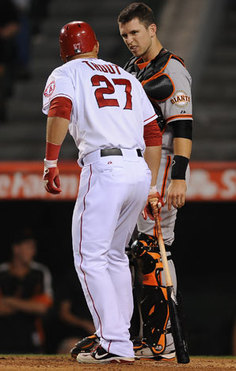 Mike Trout and Buster Posey took home the most BTP Awards
Nick Rabasco: NL Wild Card: Braves over Cardinals
AL Wild Card: Orioles over Rangers
NL Divison Series: Giants over Reds
Nationals over Braves
AL Division Series: Tigers over A's
Orioles over Yankees
NL Championship Series: Nationals over Giants
AL Championship Series: Tigers over Orioles
World Series: Tigers over Nationals
2012 World Champion: Detroit Tigers
Aidan Flynn: NL Wild Card: Cardinals over Braves
AL Wild Card: Rangers over Orioles
NL Division Series: Reds over Giants
Cardinals over Nationals
AL Division Series: Rangers over Yankees
Tigers over A's
NL Championship Series: Reds over Cardinals
AL Championship Series: Rangers over Tigers
World Series: Reds over Rangers
2012 World Champion: Cincinnati Reds
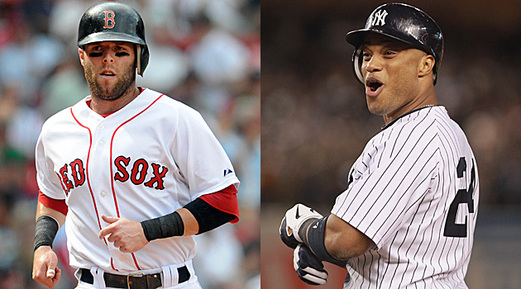 Although Robinson Cano may be having the better season, does Dustin Pedroia still claim to being the game's top second baseman? Rivalry. The Boston Red Sox and New York Yankees have symbolized the meaning of this word for generations and generations. Within these two great franchises’ lies a smaller rivalry, between two players who happen to be among the best in baseball at the keystone. So, inevitably, the question arises: who is more valuable to their team, Robinson Cano or Dustin Pedroia? Each player is better than the other at certain aspects of the game, but we will delve further into the numbers to analyze these players a little closer.
Cano has played in more games than Pedroia, but they have both played long enough to take away averages and percentages of all their combined numbers. In order to compare these superstars, we will take a look at their average season of 162 games. Both guys own solid Triple Crown numbers with the pinstriped second baseman checking in at a .306 batting average with 23 home runs and 94 runs batted in compared to Pedroia’s line of .302/17/78. These more glamorous and “sexy” statistics are the old-fashioned way, and unfortunately, still popular way at determining the value of a player. The left-handed hitting Yankees second baseman has a beautiful swing that is perfect for the short porch at Yankee Stadium, so it comes as no surprise that he is considered one of the best hitters in the game. It is clear that Cano hits for a bit more power than Pedroia, with more home runs and a higher slugging percentage (.499 to .461). In addition, give Cano credit for staying on the field at great consistency. Pedroia has been pretty durable himself, but he missed the second half of 2010 with a foot injury and close to a month in 2012 with a thumb problem. Cano has played in at least 153 games every year since 2007.
Cano also has a step up in total bases, averaging 315 to Pedroia’s 296. But hold on; total bases only accounts for a player’s bases collected via the base hit (single, double, triple, home run). Walks, hit by pitches, and stolen bases are other ways a player can control of taking a base. When adding walks, HBPs, stolen bases and subtracting caught stealing (as a caught stealing loses a base runner for the team), Pedroia has Cano beat (382 compared to 359). Additionally, Pedroia simply gets on base more than Cano (.369 OBP to .349 OBP). When he does reach, it enables his team more opportunities to score runs. As evidence, Pedroia also leads Cano in the runs category (106 to 95). Dustin is more prone to swipe a bag as well, and he is able to do it at a very solid success rate averaging 19 steals and only being caught 5 times (79%). Cano only averages 4 steals while being caught 4 times; a poor success rate (50%). While on the topic of base running, we will glance at how many outs each player makes while on the base paths (OOB). Pedroia has made an average of 5.1 outs while Cano has made 6.1 outs. In such instances, a player is thrown out trying to advance an extra base. Shifting to more negatively viewed offensive statistics, Pedroia has Cano beat out in two categories that managers lose hair over. Dustin strikes out an average of just 63 times (8.7% of his PA) and Cano whiffs an average of 81 times (11.9% of his PA). Pedroia also grounds into less double plays than his counterpart in New York (14 to 21). This means Cano makes 123 outs for his team via the strikeout or double play, compared to Pedroia’s 91.
Let’s not forget the other side of the ball: defense. Pedroia can stop the “lasers” with the best of them too. Cano does not match up to the defensive numbers Pedroia has put up. Pedroia averages just 5 errors per season (.991 career fielding %), compared to Cano’s 10 error average (.986 career fielding %). Another very important fielding stat is Rtot, where Pedroia, in the average season, nearly has Cano doubled (8.3 to 4.8). This basically measures how many runs the player was worth based on the amount of plays they made. Now, to sum everything up, we look at three statistics that measure how valuable a player is to a team overall. Pedroia has Cano beat in all three: WAR (wins above replacement), Own% (offensive winning percentage), and WPA (win probability added). Pedroia averages a 4.3 WAR compared to Cano’s 4.1. Additionally, Dustin also has a .619 Own% while Cano owns a .588 Own%. Lastly, Pedroia’s 1.1 WPA once again edges out Cano’s 0.74. Robinson Cano has had a tremendous career in New York, but the scrappy, undersized dirt-dog at Fenway proves to be more valuable to a major league baseball team.
|






 RSS Feed
RSS Feed